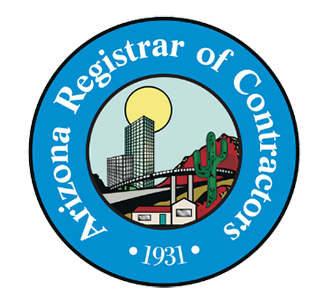Due Diligence is Key to Hiring a Reputable Contractor
Due Diligence is Key to Hiring a Reputable Contractor
Before you begin your remodeling or repair project, it is critical that you conduct due diligence on the contractors you hire. There are a few measures to take when completing your due diligence.
If time is not of the essence, meet with a variety of general contractors and subcontractors so that you have a pool to choose from when you need one. You may not have time to conduct a lengthy screening process in the event of an emergency.
Is The Contractor Licensed?
 If you have been a long-time Rosie on the House listener and/or reader of our weekly articles, then you are aware that any project that is being conducted by a hired contractor and is more than $1,000 or requires a building permit must be done by a contractor licensed by the Arizona Registrar of Contractors.
If you have been a long-time Rosie on the House listener and/or reader of our weekly articles, then you are aware that any project that is being conducted by a hired contractor and is more than $1,000 or requires a building permit must be done by a contractor licensed by the Arizona Registrar of Contractors.
To be a licensed contractor in Arizona, an entity must pass a written exam and possess a bond; among other requirements. With the exception of workman's compensation insurance, the ROC does not require an entity to possess insurance to be licensed. However, you want a contractor with liability insurance in case there is any injury on your property.
Some squirrely “contractors” will try to get around this. They may say:
- “I have a license.” -- That may be true if they mean a business license, which is not the same as the ROC license. Many contractors don’t even know about the ROC.
- “I fall under the Handyman Exemption” -- Not if they are performing electrical work and per the ROC, “Generally, if labor and materials exceed $1,000 OR a permit is required (regardless of the price of labor and materials), then a license is required. Read the Arizona Revised Statutes on "Persons not required to be licensed; penalties; applicability."
- “I can break the invoices out to be less than $1,000 each.” -- ILLEGAL. Doesn’t matter how it’s invoiced. The whole project must be under $1,000.
- “The $1,000 is only for labor.” -- Nope. The threshold is $1,000 including parts and labor.
- “I can do the work under someone else’s license.” -- ILLEGAL.
- “It’s cheaper if you use an unlicensed contractor.” -- What?! Not in the long run. You get what you pay for.
The AZROC offers these steps to ensure the work you contract for is the work you get.
 Review the contractor’s license record here using the Contractor Search.
Review the contractor’s license record here using the Contractor Search.- Check both the license number and Qualifying Party’s (person) name to see if they are listed under multiple companies.
- Make certain the contractor’s license class allows for the work listed in the contract.
- Request a list of references and check them.
- Verify the person you are negotiating your project with is an authorized representative of the licensed contractor by calling the contractor’s number listed on the ROC license record.
- Ask for written estimates from at least three (3) contractors. (Rosie recommends interviewing at least three (3) contractors vs. getting estimates from three).
- Make sure a detailed list/description of the project, including the price, the responsibility to obtain building permits, and any other relevant terms, are spelled out in the estimate.
- Review the written estimate and reconcile it with your written contract prior to signing – make sure the costs match.
- Make sure a detailed list/description of every aspect of the project is included in the contract.
- Be specific in the contract about the responsibilities of all parties involved. Click here for contract tips.
- Check out for more tips.
The ROC receives many complaints about contractors who claim to be licensed and in reality are not -- even if their advertisement says so. The only sure way of knowing that a contractor is licensed is to call the Registrar of Contractors to confirm it or by checking here.
Education & Certifications
Contractors who are members of their industry’s trade associations tend to keep up-to-date regarding technology, techniques, laws, ordinances, and other issues that affect their trade. Contractors who take it a step further and hold industry certifications are required to attain a certain number of hours each year committed to furthering their construction education. Every trade has an association.
Business Longevity
Rosie recommends hiring a contractor with a minimum of five years of experience. That is one of the requirements contractors must achieve to become a Rosie-Certified contractor.
Be wary of contractors that only have a cell phone vs. contractors that have a physical business office and address. Though in today's world, many contractors do work from home. Be sure they have an alternative way to be reached in case of an emergency.
Other Considerations & Tips
 Never make a hurried decision.
Never make a hurried decision.- Does the “Scope of Work” cover all the things you want to be completed?
- Only sign a contract agreement with a properly licensed contracting professional.
- Never pay in cash.
- Make checks payable to the name of the company/contractor listed in your signed contract.
- Never make a check payable to individuals or companies not listed in your contract.
- Get clear payment schedule so you know when payment is expected throughout the project including special-order materials, permits, and fees that need to be paid for in advance.
- Avoid door-to-door solicitors offering low-cost construction services.
- When interviewing contractors or obtaining estimates, ask for references.
- Obtain a written contract from the contractor that includes all services to be provided, the license number of the contractor, and the start-up and completion dates of the project.
Always do your homework before hiring a contractor. Contact the ROC office to ensure the contractor is licensed.
If you believe you may have been scammed, contact the ROC at (877) 692-9762 or the Tips Hotline if you believe an individual or company is contracting or advertising in violation of state statute.
Rosie’s Tip: You can often find good contractors by asking your friends and neighbors for referrals, or by asking contractors you’ve used in the past to recommend people they like to hire themselves. You can also find a list of the contractors Rosie has “certified” as well-qualified and trustworthy by our Referral Network.
Home Maintenance To-Do | #ShopTheExperts
Podcast
Before you begin your next project, it is critical that you conduct due diligence on the contractors you hire. We discuss some tips you should consider. Plus some homeowner questions on septic tanks, DIY stucco wall repair, drain odors, painting light switches, and is a walk in shower conversion a DIY project?
###
Photo Credit
- Shutterstock
- AZ ROC
Related Content
- Blog: When It Comes To Choosing A Contractor: Don’t Settle For Good; Find The Best!
- Blog: 7 Rules To Follow When You Hire A Contractor
- DIY FAQ: How Can I Tell If I’m Hiring A Legitimate Contractor?
- DIY FAQ: How Should I Go About Finding An A/C Contractor?
- DIY FAQ: Where Can I Find Rosie's Consumer Guides?
- AZ ROC: Arizona Registrar Of Contractors
- AZ ROC: Before You Hire A Contractor
